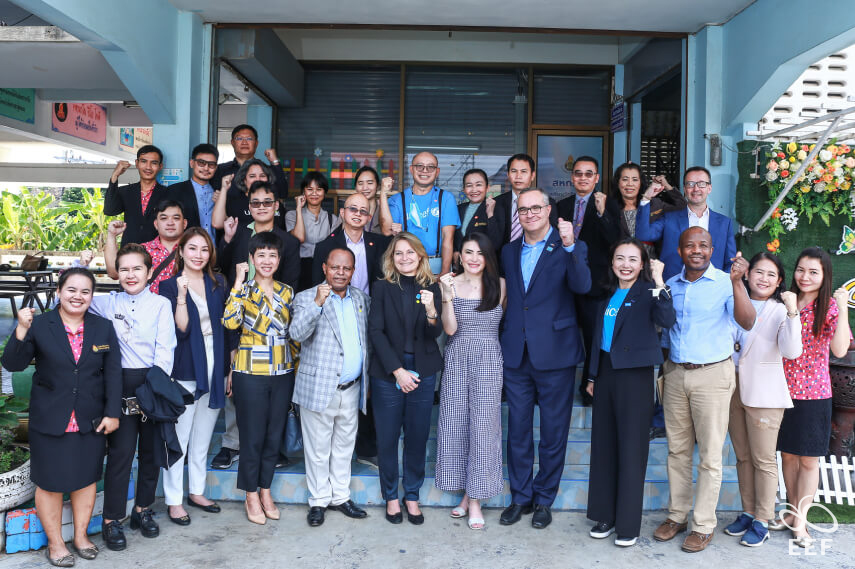
UNICEF, EEF, Starfish School Foundation visited the “Samut Sakhon Model” of learning rehabilitation school and found that children have improved in their learning development. Meanwhile, teachers could provide flexible and diverse learning arrangements. This is in preparation for expanding towards the international level of learning management during the crisis and rehabilitation of learning recession.
UNICEF Thailand, the Equitable Education Fund (EEF) Thailand, and Starfish Country Home School Foundation, together with network partners, visited the model school at Wat Sophanaram School (Plang Ruam Ratbamrung) to observe, exchange, and encourage the administrators and teachers, as well as collect data for analysis and evaluation of a framework in learning management which could be expanded to other schools at the provincial, regional and national levels. Also, this will build towards the international level after a working model is created at the provincial level of effective learning management methods amidst the COVID-19 situation until the full reopening of classes in the academic year of 2022. It is scheduled to work in the Samut Sakhon province, the first province in Thailand severely affected to cause the school to close longer than in other areas.
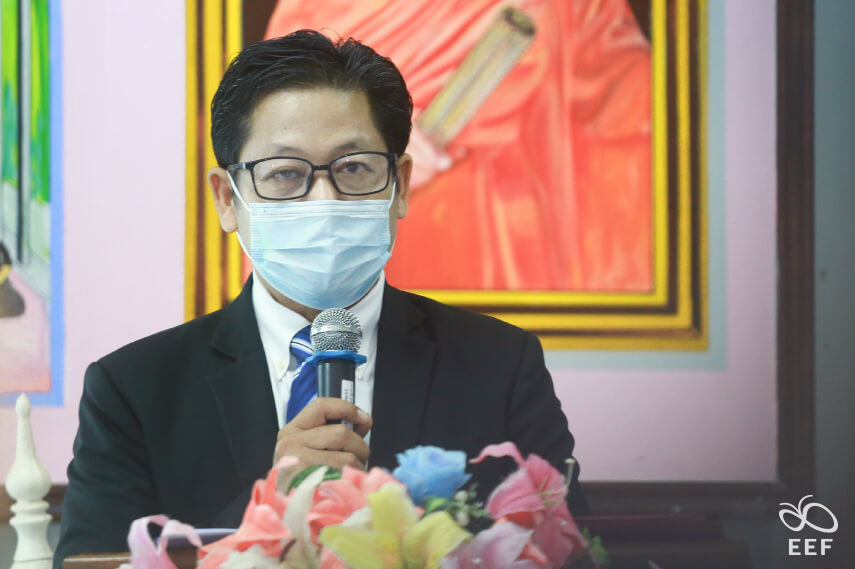
Arkhom Sansilapin, Samut Sakhon Education Commission
Arkhom Sansilapin, Samut Sakhon Education Commission, said that Samut Sakhon was the first province that was hard impacted by COVID-19, causing schools to close throughout the province. When the situation got alleviated, Samut Sakhon became the last group of provinces to resume normal schooling due to its being an industrial area. This also took a longer period for the children to learn through alternative methods, thus causing burdens to teachers and school administrators when making teaching and learning arrangements. At the same time, it was a significant challenge such that people in every area of Samut Sakhon province must help one another to support all children towards their self-learning and improvement no matter where they are.
“It cannot be denied that the crisis is the beginning of innovative cooperation in the Samut Sakhon province among the government and private sectors, as well as the civil society which joined together to consider problems and find solutions until they could create a process to help reduce learning recession and extend learning without any interruptions once schools re-opened. We have networks such as UNICEF and the Equitable Education Fund to bring support for international revitalization ideas under the principle of safe schooling to keep children from dropping out of the system and restore their learning. This is such that children were no more at risk for dropping out of the system, while we coordinate the work with the Ministry of Education project to bring children back to school. Over the past year, Samut Sakhon province has successfully brought 76 out of 77 children from the survey who dropped out of the system to return to school. This accounts for almost 100%.”
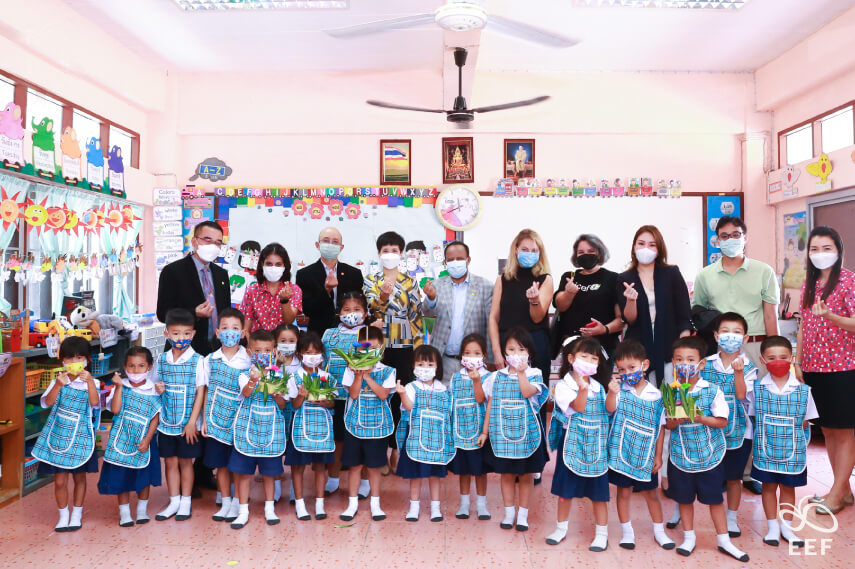
Moreover, the Samut Sakhon Education Commission also viewed that even if the children could return to learning in a normal state, several measures to rehabilitate both short-term and long-term learning are still urgent missions, with 3 main issues to resolve the learning recession: 1) establish a referral center to help students in educational emergencies; 2) assess and evaluate learning outcomes of students in all levels at the beginning of the 2022 academic year, and 3) organize a mental health promotion and help system to adjust the moods and social readiness of children before the start of their new school year. This also includes a budget allocation to help reduce the burdens of educational expenses for parents.
“For the Samut Sakhon Province, with cooperation among organizations such as UNICEF, EEF, Starfish School Foundation, schools and organizations of all affiliates in the province, we can encourage all sectors to overcome learning recession from the day that schools have not yet started in the academic year of 2022. At present, we begin to see how the work can help restore and fulfill what has been missing in children. We also have another benefit to developing teachers in their knowledge and understanding of flexible and diverse educational management. After this, we believe that despite many more crises that may come, we can ensure that children will have equal access to their self-development, knowledge, and life skills.”
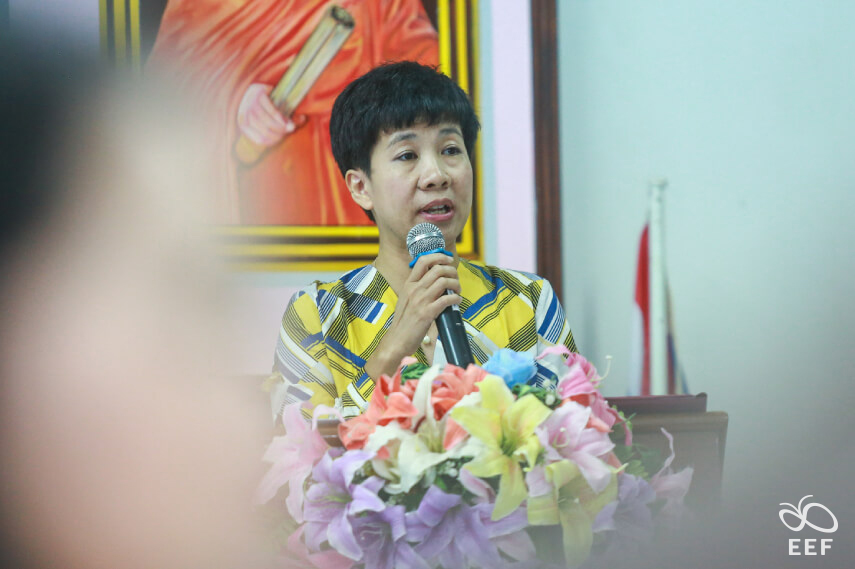
Thantida Wongprasong, Director of Office of Innovation
for Learning Opportunities, the Equitable Education Fund (EEF)
Thantida Wongprasong, Director of Office of Innovation for Learning Opportunity, the Equitable Education Fund (EEF) Thailand, said that Samut Sakhon province is the area with the longest period of school closing. Therefore, it is suitable as a model area in resolving the issue of learning recession, starting from the assessment of main problems and teacher development. The approach for rehabilitation after semester 1/65 focuses on the Thai language and mathematics because reading-writing and calculation are the foundations for learning in other subjects. Also, it adheres to the importance of physical and mental health, as well as the learning environment. During their break from school, many children were stressed and pressured by both the economic situation and the absence of social development. Therefore, rehabilitation must begin with caring for the student’s minds to adapt themselves for more effective learning.
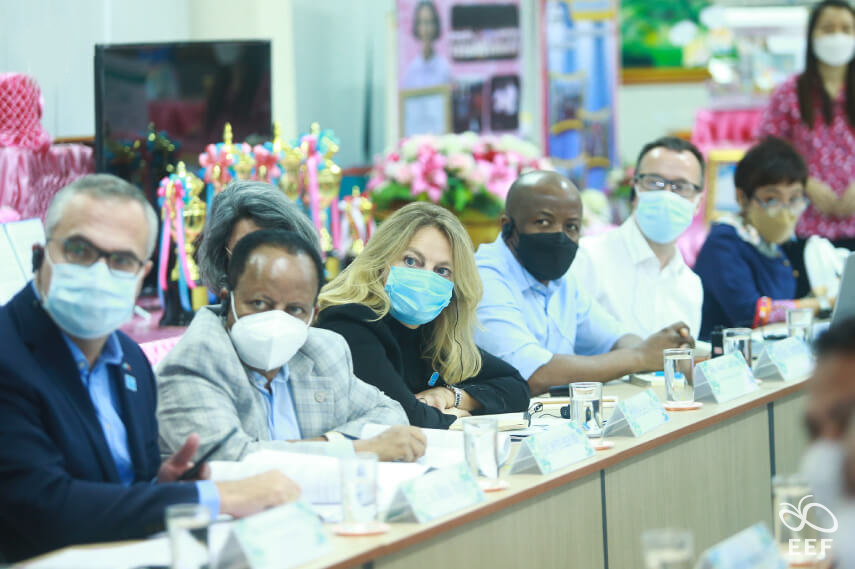
“On our field trip today, we have seen the results of 1 year of work. Both teachers and children have made very much progress. Teachers have new ways of teaching and adjust their teaching to an active learning process that focuses on each individual student in detail. Also, there is a combination of learning management methods, so-called Blended Learning, both online and on-site, as well as a learning box and an online learning library for both teachers and children towards more research anywhere and anytime, For the overall picture of development, children learn better with more concentration and cheerfulness in their new semester period.”
The Director of the Office of Innovation for Learning Opportunity, EEF said that the knowledge recession is a significant issue that the whole world faces together. Today, when we return to full schools, it is important to pay attention to the development of children individually. There should be an all-around care program to reduce the number of children at risk for dropping out of the educational system and developmental problems that will have long-term effects, especially in young children or those in early childhood who are unable to learn on their own. Results from the Samut Sakhon Model will be brought back to re-evaluate in depth a way to expand Area-based Education: ABE in collaboration with the Equitable Education Foundation in order to drive solutions at the national level.
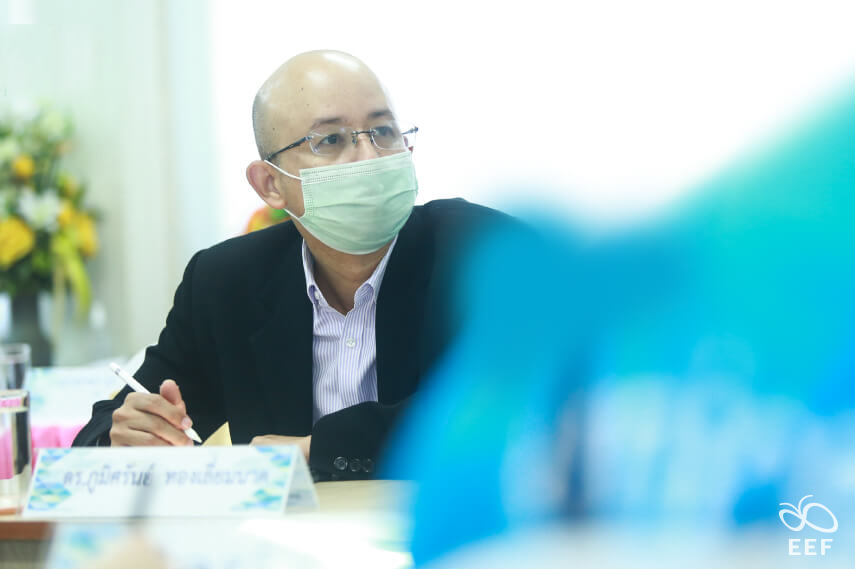
Dr. Poomsaran Thongliamnak, Director of the Equitable Education Research Institute (EEFI)
Dr. Poomsaran Thongliamnak, Director of the Equitable Education Research Institute (EEFI), added that bringing the results back for assessment requires a form called ‘randomized control trial’ (RCT), which can empirically measure the extent of the project to resolve this learning recession. If positive results are obtained at a reliable level, EEF will work with government agencies to expand those results at the national level. Additionally, lessons from the project can further develop to the international level with in-depth details, both academic evidence, and concrete achievements, by joining the UNICEF and education networks around the world. This will help make known to the international community the examples of Thailand’s success while passing on knowledge and lessons to change the educational system in different countries.

Dr. Natthaporn Chanchalia Seribut, President of Starfish Country Home School Foundation
Dr. Natthaporn Chanchalia Seribut, President of Starfish Country Home School Foundation, said that the learning model development project aims to improve both learning recession and learning rehabilitation in accordance with 3 objectives: 1) support for necessary equipment and tools for schools; 2) develop teachers for learning management in crisis; and 3) create a provincial model to rehabilitate children from learning recession.
The Starfish Country Home School Foundation has implemented 5 frameworks of learning rehabilitation as the main principles in working with schools, namely: 1) landscape Assessment; 2) Whole School Planning; 3) Professional Development Support for Teachers); 4) Intervention and Support for Students); and 5) Monitoring and Invention Re-design.
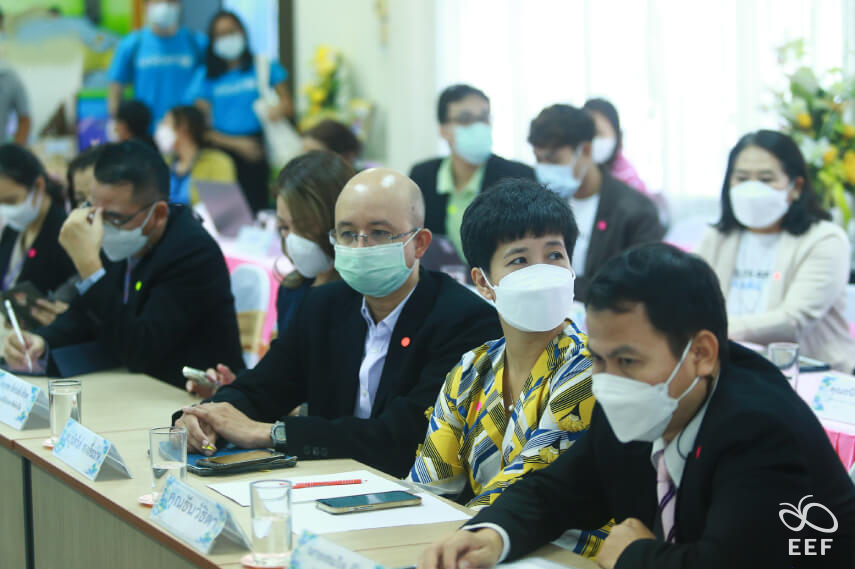
Those frameworks of learning rehabilitation could lead to the methods and activities for the foundation to work with schools by emphasizing the flexibility of learning management. Also, teachers are allowed to access their self-development through a variety of activities, such as workshops for learning among teachers from different schools, with available interest-based online lessons and a team of coaches to give advice.
“Short lessons according to teachers’ interests and needs will help teachers to improve their learning management better than additional tools alone while creating individualized learning experiences for the children. After the COVID-19 pandemic, all children have special needs in different ways. Especially, during the missing two years, each has received different experiences of learning with families in various environments. Thus, support for each individual child is a key to helping students refresh their knowledge and move on to new lessons.”
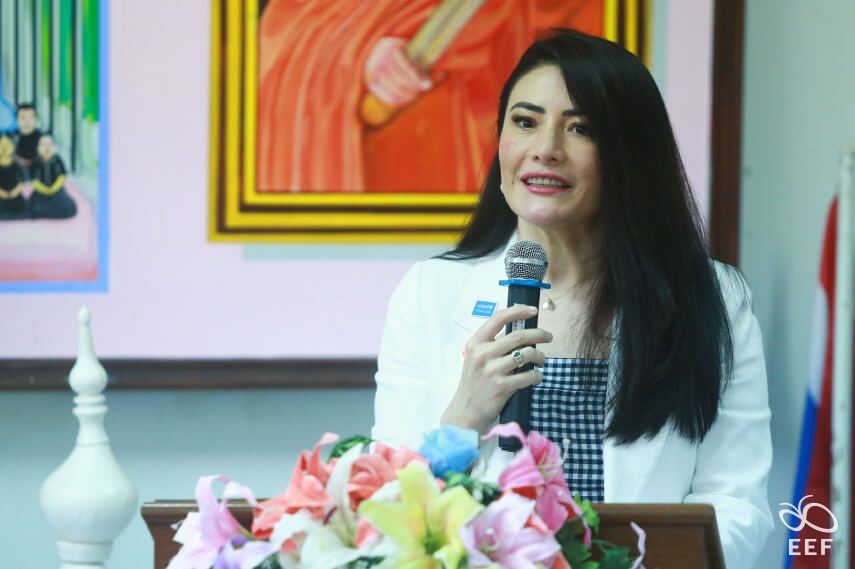
Maritza Chan Valverde, Ambassador Extraordinary, and Plenipotentiary Permanent Representative of Costa Rica
to the United Nations and Vice–President of the UNICEF Executive Committee
Maritza Chan Valverde, Ambassador Extraordinary and Plenipotentiary Permanent Representative of Costa Rica to the United Nations and Vice – President of the UNICEF Executive Committee, said that she would like to thank all teachers and staff who are important forces in helping children for their learning development. Today, we need to work together to resolve the problem of learning regression because learning is a fundamental right that everyone deserves. More importantly, education makes all human beings equal. Without education, children will grow up without life skills. The damage will have an effect on both the individual level and the country’s future development as a whole.
“Our visit to the working area today focuses on the importance of working together for cooperation towards the future of children. Congratulations and our appreciation to Thailand for putting the education agenda at the heart of the country’s recovery after the COVID-19 crisis. From the model of Samut Sakhon province, teacher development is seen as the foundation for education in the modern world. When having a model from one place, it can be applied for the development in other schools for all other areas nationwide or it can become a model for other areas in the world. Finally, our results will show that together we can bring changes for a better quality of life to many children.”

